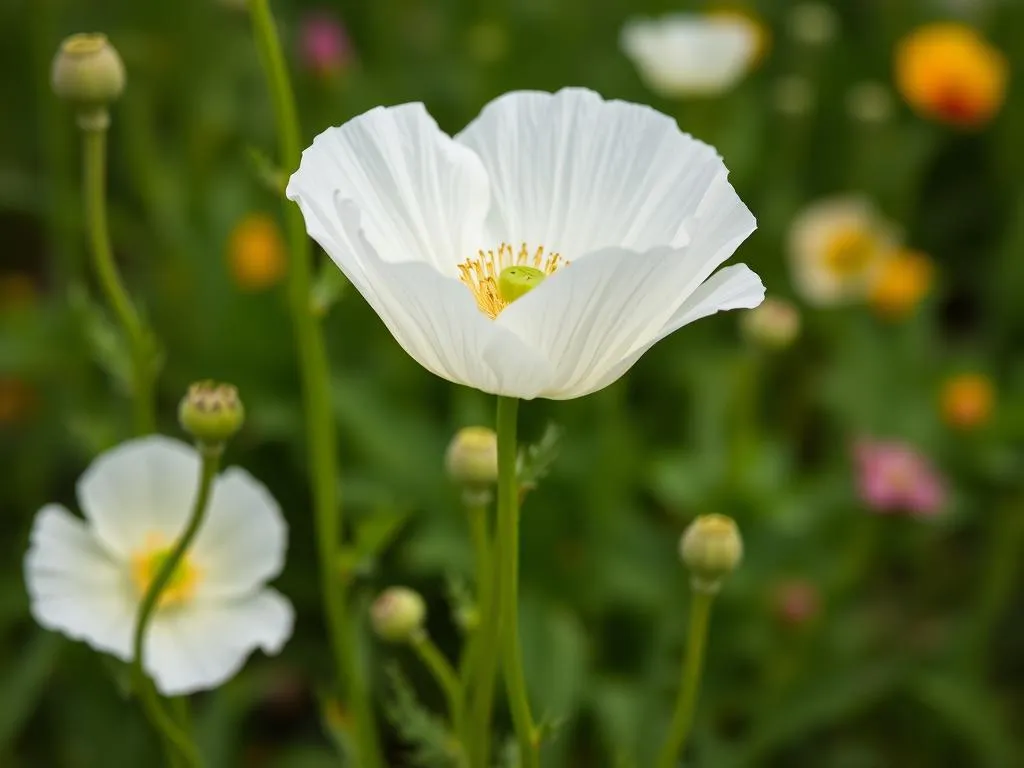Introduction
The white poppy, with its delicate petals and serene beauty, holds a profound spiritual significance that transcends its physical form. In the realm of spirituality, the white poppy symbolizes peace, remembrance, and a deeper connection to the divine. Whether you’re drawn to the white poppy’s ethereal charm or seeking to deepen your spiritual understanding, exploring its white poppy spiritual meaning can be a transformative journey.
In this article, we’ll delve into the white poppy spiritual meaning, uncovering its rich symbolism and how it can inspire personal growth, introspection, and a greater sense of harmony within your life. By understanding the deeper significance of this captivating flower, you’ll be able to incorporate its teachings into your spiritual practice and find new ways to connect with the sacred.
Key Takeaways
- The white poppy spiritual meaning represents peace, remembrance, and a connection to the divine.
- The white poppy is often associated with honoring those who have lost their lives in war, promoting nonviolence, and cultivating inner tranquility.
- Exploring the white poppy spiritual meaning can inspire personal growth, introspection, and a greater sense of harmony within your life.
- Incorporating the teachings of the white poppy into your spiritual practice can help you find new ways to connect with the sacred and find inner peace.
The Spiritual Significance of the White Poppy
The white poppy spiritual meaning is deeply rooted in its physical attributes and the historical contexts in which it has been revered. With its delicate petals and serene appearance, the white poppy is often seen as a symbol of purity, innocence, and tranquility. In many spiritual traditions, the white poppy is associated with the divine and the sacred, representing a connection to the higher realms of consciousness.
One of the most prominent spiritual associations of the white poppy is its connection to peace and nonviolence. The white poppy is often worn or displayed as a symbol of remembrance for those who have lost their lives in war, promoting a message of pacifism and the rejection of violence. By honoring the white poppy, individuals and communities can cultivate a deeper sense of empathy, compassion, and a commitment to resolving conflicts through peaceful means.
Exploring the Deeper Symbolism of the White Poppy
Beyond its connection to peace and remembrance, the white poppy spiritual meaning also encompasses themes of introspection, personal growth, and a deeper understanding of the self. The white poppy’s delicate nature and its ability to thrive in challenging environments can be seen as a metaphor for the human experience, reminding us of our own resilience and the power of inner strength.
As you contemplate the spiritual significance of the white poppy, you may find yourself drawn to explore themes of vulnerability, letting go, and finding harmony within the chaos of life. The white poppy’s ability to bloom amidst adversity can inspire you to embrace your own challenges and see them as opportunities for personal transformation.
Incorporating the White Poppy into Your Spiritual Practice
Integrating the teachings of the white poppy spiritual meaning into your spiritual practice can be a deeply rewarding and enriching experience. Whether you choose to incorporate the white poppy into your meditation practice, use it as a source of inspiration for your creative endeavors, or simply appreciate its beauty and symbolism, the white poppy can serve as a powerful tool for personal growth and inner peace.
One way to connect with the white poppy’s spiritual significance is through meditation and visualization exercises. Imagine yourself surrounded by a field of white poppies, feeling the gentle breeze caress your skin and the serene energy of the flowers permeating your being. As you breathe deeply, allow the white poppy’s message of peace and tranquility to wash over you, and let go of any worries or anxieties that may be weighing you down.
Another approach is to incorporate the white poppy into your creative practice. Whether you’re an artist, a writer, or a musician, the white poppy’s symbolism can inspire you to explore themes of resilience, vulnerability, and the beauty that can arise from difficult circumstances. By using the white poppy as a muse, you may find that your creative expression takes on a deeper, more spiritual dimension.
Honoring the White Poppy’s Legacy
Throughout history, the white poppy spiritual meaning has been revered and honored in various cultural and religious traditions. In some communities, the white poppy is used in rituals and ceremonies to commemorate those who have lost their lives in war, serving as a poignant reminder of the devastating impact of conflict and the importance of promoting peace.
In other spiritual traditions, the white poppy is seen as a symbol of transformation, representing the cycle of life, death, and rebirth. The poppy’s ability to thrive in challenging environments can be seen as a metaphor for the human experience, reminding us of our own capacity for resilience and growth.
As you continue to explore the white poppy spiritual meaning, consider how you can honor its legacy and incorporate its teachings into your own life. Perhaps you could participate in a remembrance ceremony, plant a white poppy garden, or simply take a moment to reflect on the deeper significance of this captivating flower.
Conclusion
The white poppy spiritual meaning is a rich and multifaceted topic that invites us to explore themes of peace, remembrance, personal growth, and a deeper connection to the divine. By embracing the white poppy’s symbolism and incorporating its teachings into our spiritual practices, we can cultivate a greater sense of inner peace, empathy, and a renewed appreciation for the beauty and resilience that can be found in the natural world.
As you continue your journey of spiritual exploration, I encourage you to keep the white poppy’s message close to your heart. Let its delicate petals and serene presence inspire you to find new ways to connect with the sacred, to honor those who have sacrificed, and to cultivate a more peaceful and harmonious world.








